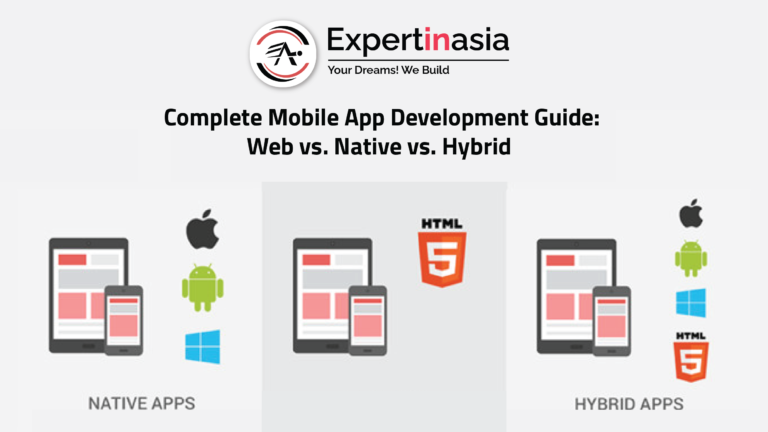Mobile apps can help you reach a large audience that is increasingly reliant on apps to complete tasks throughout the day. It is not easy to develop a mobile app. As a result, you must carefully consider your mobile app strategy.
When you’ve determined the best strategy and are ready to begin implementation, there are three types of mobile app development services to consider:
- Native Mobile App Development.
- Hybrid Mobile App Development.
- Web App Development.
Consider all three before developing a mobile application, weigh their benefits and drawbacks and then make an informed decision.
Let’s learn about these three types of mobile apps and help you choose the best one for your needs.
Introduction to Web Apps, Native Apps and Hybrid Apps Development
All three types of mobile apps are appropriate for certain types of mobile apps. Let’s take a quick look at each:
Web App Development
Web apps are not installed on mobile devices. They are instead hosted on web browsers and are essentially websites that look like native mobile apps. A web view is used by users to interact with web apps. Web apps, as opposed to information-only websites, are functional. When you want to create a single mobile app for your entire audience, web apps are an excellent choice. Web apps do not need to be developed for separate mobile platforms because they run in the browser.
Native apps are those that are created, designed and deployed with a single mobile operating system in mind. They are more difficult to create than web apps because they take platform specifics into account and use specific mobile app development languages. A native mobile app developed for one mobile operating system (iOS or Android) will not work on another. So, if you want to reach two distinct audiences, you’ll need two separate teams working on native Android and iOS apps.
Hybrid App Development
Hybrid apps are a combination of native and web apps. They are installed similarly to native mobile apps but have the look and feel of a web app. Hybrid apps are the best option for MVPs because they can be developed quickly with limited resources and tested after launch. Hybrid apps can be written once and deployed across multiple platforms using a single web technology codebase. Let’s take a look at the benefits and drawbacks of each mobile app development service.
Advantages and Disadvantages
Web Applications
Here are some advantages of using web apps in your business :
- Web apps are simple to maintain because of their simple codebase and bugs are straightforward to locate and fix.
- Web apps share codebases across platforms, allowing projects with limited budgets to be completed with web apps without sacrificing app reach.
- Because the apps do not need to be updated in an app store, the distribution, deployment and release of new features are quick.
- Because you only need to deploy one codebase across mobile operating systems, development costs in terms of time and effort are lower.
- A few JavaScript APIs allow web apps to access device-level features.
What you don’t get when you use a web app :
- User interactions with the app are not as smooth and seamless as they are with other types of mobile apps.
- The user interface design elements may be inconsistent. Push notifications, working offline and loading on the home screen, for example, are not available in a web app.
- Because web apps cannot be uploaded to app stores, their potential user reach may be limited.
- Web apps are frequently slow to respond and cannot be accessed without an active and strong internet connection on the user’s mobile device.
Native Applications
Here are some reasons why you should use native app development :
- Because they are tailored to specific platforms, native apps are extremely responsive.
- They operate at high speeds, enhancing the user experience.
- Native apps are extremely fast.
- Because they are made available through app stores, they reach a larger audience.
- Native apps are much faster and more interactive in terms of user input and output.
- Native apps can take advantage of all device features to provide users with an unparalleled experience.
- An internet connection is not required for native mobile apps, though it may be a preferred feature.
- Native apps use less hardware and have more efficient code because each mobile platform has its own set of standard UI practises.
Here are some reasons why native app development may not be for you :
- Native apps are more expensive because they must be developed and deployed separately for each leading mobile platform.
- Native apps take time to develop, which increases their cost.
- There is no cross-platform support for native apps. An app designed for Android will not work on an iOS device.
- Publishing a native app to Apple’s app store may necessitate prior approval.
- The upkeep and updating of native apps are time-consuming processes.
- Building a native mobile app necessitates the use of developers who are fluent in difficult programming languages, which raises the cost.
- Native app development is not the best option for mobile applications with simple and basic.
Hybrid Applications
Here are some of the reasons why hybrid apps are a good choice for mobile app development :
- Hybrid apps have a single codebase, which allows you to write code once and deploy it across multiple mobile device platforms.
- Cross-platform mobile applications are supported by hybrid apps, which reduces development costs and time.
- With standard web technologies, hybrid mobile app development is simple, quick and cost-effective.
- Hybrid apps can be promoted in app stores and reach a large number of people.
- Hybrid apps can benefit from simple and quick updates.
- This type of app can be made to work in the background.
- Hybrid mobile applications provide access to the device’s internal APIs, allowing your app to interact with hardware components.
Below are a few reasons why hybrid apps are a good choice for mobile app development :
- Hybrid apps have a single codebase, which allows you to write code once and deploy it across multiple mobile device platforms. Cross-platform mobile apps are supported by hybrid apps, reducing development costs and time.
- With standard web technologies, hybrid mobile app development is simple, quick and cost-effective.
- Hybrid apps can be promoted in app stores and reach a large number of people.
- Hybrid apps can benefit from simple and quick updates.
- This type of app can be made to work in the background.
- Hybrid mobile applications provide access to the device’s internal APIs, allowing your app to interact with hardware components.
Which is the clear winner when it comes to mobile app development?
As you might have guessed, there is no winner here. Instead, the winner would be determined by the various types of mobile app requirements that businesses have.
However, before settling on a specific mobile app type, consider the following :
- Your mobile application development budget.
- Your app deployment schedule.
- The user experience you want your app to offer should be excellent.
- The complexity or simplicity of the app features that you require.
- Whatever approach you take to mobile app development, your app should be fast, interactive, intuitive and responsive.
- User expectations for in-app experiences are at an all-time high and you don’t want to disappoint your audiences. A mobile app can be an excellent sales and marketing tool for your company.





